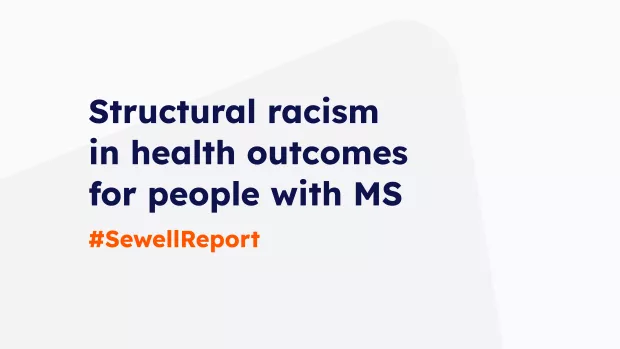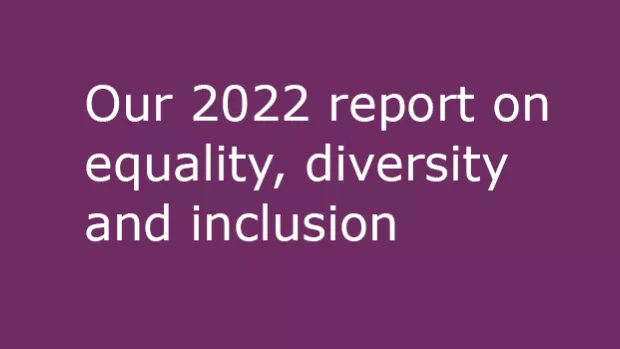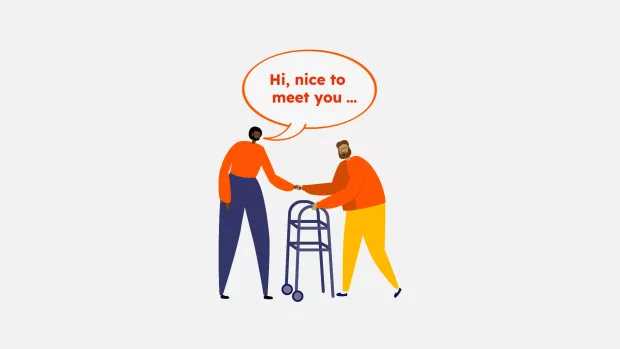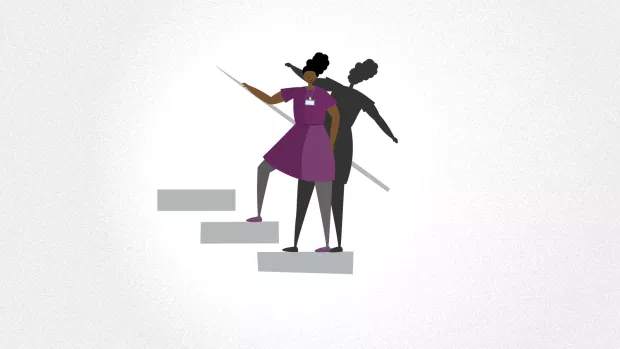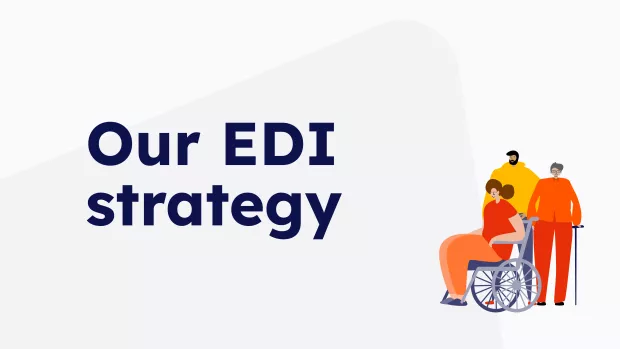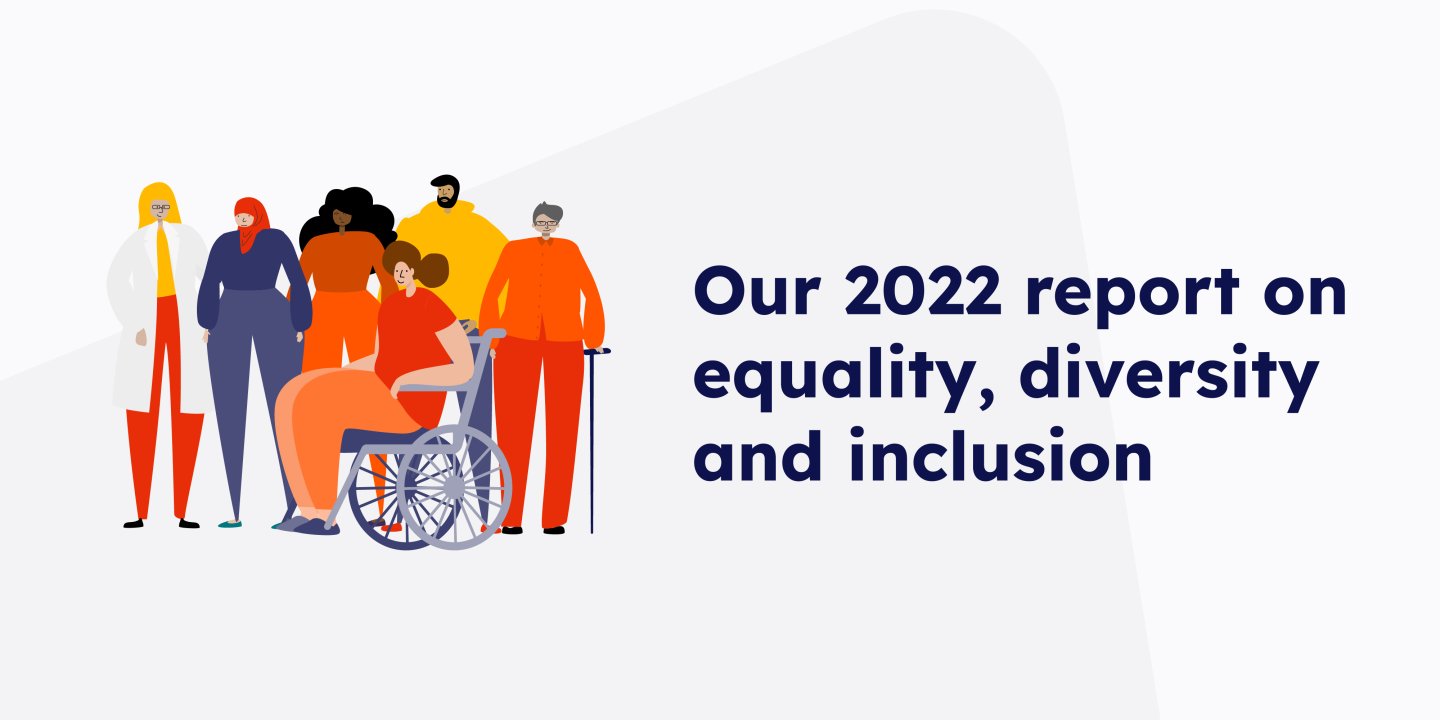
Improving equality, diversity and inclusion (EDI): Our progress and plans
Our new corporate strategy for Equality, Diversity and Inclusion (EDI) sets out our ambitions for the period 2021-24. Our action plan looks at how we're going to get there.
Our implementation plan sets out the actions we'll take. We'll measure our progress using key performance indicators (KPIs). These KPIs help us reach our strategic objectives.
The implementation plan also sets out how governance, accountability and communications will underpin this work.
Find the specific actions we'll take in section 6. Our plan for EDI: actions from now until 2024. We invite you to hold us to account by joining our reference group. Find out more about our EDI Reference Group.
Our implementation plan for equality, diversity and inclusion
In developing this plan, we tried to balance our own lack of expertise in some areas with the need to make progress quickly. We acknowledge that in many areas we do not have the knowledge, insight and experience to design things like an outreach programme to specific seldom-heard groups. We will need to co-produce solutions with others in the community. However, we don’t want to make perfect the enemy of good. Where there are clear needs, we will not wait for a detailed evidence base to take action, and we will learn by doing wherever possible.
A result of this is that in some areas of the plan we are setting out clear actions that we will take starting now, while in a few we are more cautious. We are setting ourselves a clear timetable to scope more detailed actions, but the actions beyond that will depend on the scoping phase.
Summary of our objectives
We’ve grouped our objectives and actions into seven areas.
- To promote the voice of people facing discrimination, we will gather better evidence about inequality and build this into our campaigning work at national and grassroots level.
- To broaden our reach, we will undertake a new programme of outreach to seldom-heard groups within the MS community. We will partner with other organisations to improve awareness of the help and support we offer, and co-produce support where there are gaps.
- To ensure more inclusive experiences for people with MS we will create new ways for people to connect with each other and make sure our communications are accessible and relevant to everyone.
- To recruit and foster diverse talent we will go further to attract diverse candidates for our vacancies and make sure they are recruited without conscious or unconscious bias.
- To foster diverse volunteer opportunities, we will make sure we reach more diverse applicants, support local groups to maximise inclusion, and improve data and insight on volunteer experiences.
- To build an inclusive working culture we will embed EDI in our decision-making processes. And we’ll roll out a major programme of training for staff accompanied by peer support and mentoring, as well as make sure all colleagues have annual EDI objectives.
- To make sure we progress and are accountable we will hire a new dedicated EDI lead role, set clear targets and transparently publish independent reviews of progress.
Investing in change for everyone affected by MS
To make all this happen we’re allocating many hundreds of hours of staff time and over £100,000 in new investment for
- a new EDI lead role
- a comprehensive training programme
- new ways for everyone affected by MS to connect with each other.
Living our values
Our organisational values underpin the delivery of this Strategy and Implementation Plan.
Bold – we recognise injustices faced by our MS community, especially people whose intersectional experiences mean they face even greater prejudice. And we’re not afraid to confront these injustices head-on. We want to recognise and call-out where our own organisational issues perpetuate injustices. And where our programmes, projects and processes may exclude people already under-represented in what we do.
Expert – we acknowledge we may not always have the expertise to deliver on our objectives. We will collaborate and draw on the skills and experience of partnerships inside (for example, Asian MS) and outside of the MS Society. And, where we face an obvious gap in knowledge and resource, we will recruit new members of staff to help us achieve our goals.
Ambitious – we have created an EDI Strategy and Implementation Plan that we believe is ambitious while still deliverable in the timeframe. The Implementation Plan is a living document. For every objective, we will continue to explore where we can add value, continue to learn and develop in an iterative way, and so deliver even more ambitious work.
Together – we must work collaboratively and inclusively with as many stakeholders as possible (internally and externally) to achieve what our EDI plans. We need to bring colleagues, volunteers and partners with us on this journey and make sure we support their involvement at every step of the process. Delivering this Strategy and Implementation together is the only way we can be successful.
Considering different groups of people
We are very aware no two people affected by MS are the same. So to talk about “minority groups” or “people from ethnic minority backgrounds” is to lump together many people with extremely diverse perspectives and experiences.
For this reason, we have tried wherever possible, to specify the groups we think are most likely to benefit from each action.
We expect many actions set out in this plan will benefit a lot of different groups (for example making our recruitment practices more inclusive). Or will benefit different groups in different circumstances (for example, requiring all staff have an annual EDI objective).
However, for some others we must be honest about the fact that we do not have the resources to try and benefit everyone at once. A good example is our work around outreach to seldom-heard groups. If we do not start with some specific groups there is a real risk our energy will dissipate in different without having much impact.
Where we’ve had to make these decisions, we’ve tried to be open and honest about them. Our guiding principle has been where we think we have the strongest opportunities to have impact. For groups where we don’t have such strong opportunities, during the next four years we’ll try to get ourselves in a better position to have impact in the future, for example through more research and insight work.
Our progress on EDI has not been as swift or as ambitious as it should have been. However, it is important to note recent actions we’ve taken, as they are naturally a point of departure for this new more ambitious action plan.
Building and deepening connections
- We continue to deepen our understanding of EDI in the MS community. In 2018 we completed a major research project with groups we traditionally struggle to reach about their experiences of MS and perceptions of our work. The project captured rich equalities data about our MS community which we’re drawing on to underpin our work and measure outcomes.
- We established an internal network of EDI champions across the organisation. EDI Champions and people with MS have come together at a series of workshops to co-produce detailed plans for the future.
- We centred the experiences of our community at more EDI events and awareness days. In 2019 we had our first ever official MS Society presence at Pride marches in London, Belfast and Cardiff. We shared stories from staff and our community about their intersectional experiences of being LGBTQ+, mixed heritage and living with MS. In 2020 we marked UK Black History Month for the first time and we continue to raise awareness on the International Day of the Disabled Person.
- We put EDI at the heart of our new corporate strategy, with plans to improve our reach to all parts of the MS community and make sure everyone feels included in what we do and how we talk about it.
-
We consulted with research advisors and other medical research charities to begin mapping out EDI challenges in MS research. We have developed a specific research action plan to deepen our understanding through increased data collection and to start making progress in priority areas. You can download it in the side bar on this page.
Improving staff diversity and inclusiveness
- We’ve committed to always advertise externally for roles at Head and Director level, to make sure we give senior opportunities to a wide range of candidates and make sure recruitment for senior positions always includes working with an agency with a strong track record on recruiting staff from under-represented backgrounds. We hold all agencies we work with, as well as ourselves, to account for providing a pool of candidates that reflect the diversity of the society we live and work in.
- We've introduced anonymous recruitment (where recruiters don’t see candidates’ names on applications).
- We guarantee interviews for disabled candidates if they meet the minimum requirements for the role.
- We worked with a specialist recruitment agency to attract a more diverse pool of applicants to join our Board of Trustees, which has improved our board diversity.
- We delivered unconscious bias training to all managers and other staff involved in our staff restructure to make sure we made fair recruitment decisions, the first phase in our wider roll out.
- We produced equality impact assessments at each stage of the staff restructures to transparently show the effect of decisions on different groups and provide assurance that decisions were fair.
- We completed a staff survey on EDI to feed into our new strategy
- Our CEO Nick Moberly formally committed to the principles established by the Association of Chief Executives of Voluntary Organisations.
Support and promote the voices of people who face discrimination
In 2022, we want to see
- our national and local campaigning proactively calling out inequality
- consideration of EDI impacts embedded in decision-making for Board-level strategic decisions
- all colleagues will have EDI in annual objectives.
In 2023, we want to see
- a full policy position on reducing inequality amongst people with MS, accompanied by dedicated campaigning
- EDI considerations embedded in all our decision-making and project management processes.
In 2024 we want to see no more than 5% variation in access to health and care services compared to average for people with MS for:
- people with MS from ethnic minority backgrounds
- people with MS who say they are struggling on their income.
Broadening our reach
Year-on-year we want to become more representative of society overall in terms of the people who:
- access our services
- engage with us on social media or through our website
- get involved in our work (for example, by campaigning or joining our research network).
More inclusive experiences for people affected by MS
In 2022 and 2023 we want to see more and more people every year from ethnic minority backgrounds and lower socio-economic groups responding to surveys saying the MS Society is for them.
In 2024 we want to see no more than 5% difference between groups mentioned and overall scores. For example, if 80% of everyone who's sent the survey says that the MS Society is for them, we want at least 75% of everyone in a lower socio-economic group to say the same. On top of this, we want no more than 10% difference between any group mentioned in the Equality Act 2010 and overall scores.
Recruiting and fostering diverse talent
In 2022 and 2023 we want to see
- year-on-year increase in diversity of candidates applying for roles
- year-on-year increase in diversity of workforce at all levels
- promotions of people from underrepresented groups at least at equal levels to all other colleagues
- leavers reporting dissatisfaction with EDI issues was not a factor in their decision to leave
Recruiting and retaining diverse volunteers
From 2022 – 2024 we want to see
- volunteer diversity increase in line with the UK population. We want our volunteer numbers to rise from 7% of volunteers being from non-White-British backgrounds to 14%. And we want to see our average age decrease from 53 to 47.
- informal feedback that tells us our culture feels more inclusive
- volunteers who leave us not disproportionately being from under-represented groups. We’ll use Leavers’ Survey data assessed against baseline data to assess this.
- volunteers leaving from under-represented groups not citing EDI issues as a factor. We’ll use qualitative feedback from the Leavers’ Survey to assess this.
Building an inclusive culture
In 2022 and 2023 we want to see
- year-on-year increases in colleagues who report in surveys that MS Society feels inclusive
- colleagues demonstrating increased awareness of EDI issues in their day-to-day work, evidenced by quality of work produced
- Staff surveys showing colleagues more confident in identifying and reporting bad behaviour.
In 2024 we want to see
- an overall positive inclusion score of at least 80% of survey respondents
- colleagues who identify as disabled, from an ethnic minority background, or who are LGBTQ+ having the same inclusion score as other staff and volunteers.
Improving our use of data and insights to underpin decisions and accountability
In 2022 we want to see
- implementation of standardised EDI demographic data collection
- co-ordinated data collection and insight research work to broaden the breadth and depth of insights and evidence.
In 2023 we want to see year-on-year improvement in the breadth and depth of data and insight we gather and use to understand different lived experiences, our progress and impact, and for decision-making.
In 2024 we want to see greatly improved understanding of
- the experiences of people affected by MS, staff, and volunteers from different minoritised groups
- the most effective role we can play in responding to them.
To successfully deliver the EDI strategy everyone will need to get involved. The main people and groups involved in the oversight and delivery of the strategy are:
Board of Trustees
Purpose
- Overall leadership and strategic input as well
- Ensuring accountability for progress
Members
Trustees, detailed input delegated to the People Committee
Activity group
Purpose
- Coordination and oversight of all the organisational activities
- Cross organisational prioritisation and resource allocation decisions
- Peer review progress on individual activity.
Members
Executive Group, Leadership Team and subject experts.
EDI Activity Group
Purpose
- Develop and champion the strategic approach
- Ensure the implementation of the EDI strategy, track the progress, understand and manage the risks and measure the impact
- Trouble shoot
- Explore new ideas and innovation and consider how they can be implemented
- Report progress and risks to the Activities Oversight Group.
Members
- EDI Programme Lead (Amy Reeves)
- EG Lead for EDI (Vicky Annis)
- Director of Income Generation (Ed Tait)
- Director of Services (Sam Walker)
- Head of HR (Caroline Woolley)
- Head of Strategy and Business Intelligence (Mital Patel)
- Head of Internal Communications and Engagement (Lucinda Lowe)
- Volunteering and Community Networks Transformation lead (Emily Perriam)
- Head of Volunteering and Community Networks (David Light)
- Head of Governance (Penny Coombes and Frances Brown)
- Research Programme Manager (Jacqui-Ann Hanley)
- Head of Research (Clare Walton)
- Head of Marketing (Vix Proctor)
- Senior Engagement Officer (Jessica Mansel)
- Editorial Manager (Babs Guthrie)
- Policy and Research Programme Administrator (Ann McDougal)
EDI Champions
Purpose
To help coordinate and drive forward actions within particular directorates or cross-cutting functions (for example, communications).
Members
- Babs Guthrie (EDI communications champion)
- Jonathan Blades (EDI restricted funding champion)
- Vix Proctor (Engagement and Income Generation champion)
- Carmel Barret (Services champion)
- Beth Grimsey (Research champion)
- Lauren Kilbee (Research champion)
- Jen Clifford (Digital and Content champion)
- Louraine Palmer (Chief Executive's Office champion)
- Sam Pyke (Corporate Services champion)
- Alli Mundy (Corporate Services champion)
- Joshua Barnbrook (Community Networks champion)
- Fiona McDonald (MS Society Wales champion)
EDI Reference Group
Purpose
- To provide the EDI steering group with diverse perspectives (incorporating staff, volunteers and people affected by MS) on key strategic and operational questions
- To provide the EDI Activity Group with a collective view on progress each year.
Members
- Staff, volunteers and people affected by MS often (but not exclusively) from ethnic minority backgrounds and who consider themselves disabled
- Staff network chairs: race, ethnicity and cultural heritage (REACH), disability and LGBTQ+. These networks are for staff and by staff, so not a formal part of the corporate governance. But the chairs will sit on the reference group to provide a link to the networks and a forum to raise issues and input on key decisions.
We will refresh the membership of the reference group with call-outs to staff and volunteers for expressions of interest.
Updated 18 September 2023
Publication
We will publish this action plan on our website in December 2021, using social media to publicise our key commitments and the outcomes we expect from them.
We’ll also include a summary of the plan in our MS Matters magazine, communications to volunteers and other appropriate channels.
Updates
We will publish updates to the action plan as we make progress in scoping new areas and ambitions. We expect to publish updates mid 2022, early 2023 and early 2024.
We will also provide quarterly updates on progress to our Board of Trustees’ People Committee and publish them on our website.
Accountability
We’ll publish an annual progress statement from the EDI Activities Oversight Group including KPIs and views of our EDI reference group on our website. This means some of the people most affected by the strategy (colleagues, volunteers and people affected by MS) will review the policy regularly.
In late 2024 we will also publish an independent assessment of where we are in terms of completing the activities in the action plan and if they’ve led to the outcomes we hoped for. Producing this will be a key process for considering further plans after 2024.
These are the actual and perceived barriers that could disrupt the delivery of the EDI action plan. We need to consider them and take action to remove or reduce their impact.
Functions and colleagues doing their own thing
As we start to implement the strategy, colleagues are very committed to make changes. While this is a great position to be in, it could result in a wide range of dispersed, smaller impact projects being implemented across the organisation. That could dilute the overall impact of the strategy and resources that we have available.
Finding the right balance between the dispersed projects and the coordinated workstreams under the strategy is important. We can do it by:
- having organisational themes which the dispersed initiatives can focus around. For example, focusing on a specific seldom heard section of the community or cross-organisational initiative like data collection
- having a clear communication plan to make sure this is widely understood.
Lack of evidence may prevent us from moving forward
We don’t want to be thwarted by what we don’t know. We should use the information and knowledge we currently have to gain further information. If sometimes our lack of knowledge does send us in the wrong direction, that shouldn’t be seen as failure but as us listening, learning and growing.
Difficult issues and confrontation may result in loss of confidence in the direction of travel
This strategy is not going to be easy to implement and may receive negative comments and tension among volunteers and staff, our MS community and wider audiences.
In order to stand strong behind the commitments we’ve made in the strategy we need to:
- clearly communicate the strategy, so that its vision and reasons for change are understood. And make sure all our stakeholders and influencers are in agreement
- make sure we can confidently respond to negative comments by:
- training staff and volunteers how to respond
- clear approaches for managing complaints
- crisis management plan for when issues escalate
Loss of profile and momentum because the external agenda moves focus
The strategy recognises that external events caused us to take a harder look at ourselves. It is likely that at some point the external agenda will move focus. When this happens we must make sure this strategy remains a priority for us until we achieve our vision. To do that we need to:
- collect data and evidence about where we are on the journey to achieving the strategy and the impact we are having
- make sure we continuously communicate our EDI strategy, achievements and progress.
People with MS not in priority groups are alienated
As set out elsewhere in this action plan, we have to prioritise certain groups of people for some EDI actions – most notably around our outreach work. This creates the risk that groups not prioritised in this way will think we see them as less important and turn elsewhere. To prevent this from happening we need to:
- be clear on the many actions that improve equality, diversity and inclusion for everyone in our MS community
- move quickly to improve our evidence base around seldom heard groups
- give sufficient profile to actions that will put us in a better place to address other groups in the future. For example prominent signposting to research opportunities.
Leadership behaviour
Evidence shows that if EDI is not embraced enthusiastically and visibly by people in leadership positions, it’s less likely to progress at the rate we expect in this plan. We will make sure leaders are supported to role model EDI in action by:
- regularly showcasing different perspectives and discussing EDI in both leadership-specific events and wider all-staff events
- robust governance to ensure accountability for progress across the organisation.
General commitments
Making sure we make progress with our plans
In 2022 we’ll
- hire an EDI lead
- update the governance structure for how we achieve our plans
- publish an annual report on progress
In 2023 we’ll publish another report on progress.
In 2024 we’ll publish our annual report on progress and commission an independent review.
By the end of 2024 we want to have achieved our outcomes with full transparency and accountability.
Building our insight in seldom-heard groups of people with MS
In 2022 we’ll
- co-ordinate data collection and insight research work to broaden the breadth and depth of insights and evidence especially on seldom heard groups
- implement standardised EDI data collection (including data storage)
In 2023 and 2024, we’ll build on outreach for more qualitative and quantitative research
By the end of 2024 we want to better understand the lived experience of MS for minoritised groups. And the most effective role for us in responding to this.
Support and promote the voices of people who face discrimination
Building evidence on inequality
In 2022 we’ll do a major push to make sure our "My MS, My Needs" survey captures different facets of inequality of outcomes and experience.
In 2023 we’ll commission more evidence, focussing on the most significant findings from My MS, My Needs.
In 2024 we’ll report on inequality in the MS community with policy recommendations for change.
By the end of 2024 we want to be able to give a clear picture of inequality in the MS community. And a call to action for government, wider society and the organisation itself to end this.
People who face discrimination have a chance to raise their voice
In 2022 we’ll provide
- myth-busting evidence and support for minoritised people to dispel prejudices within their own communities
- know your rights material to empower grassroots activism
In 2023 our policy campaigns will routinely focus on inequality within a wider campaign theme (like welfare reform and treatment access).
In 2024, we’ll potentially run a full campaign on narrowing inequality in the MS community.
By the end of 2024 we want to see no more than 5% variation in access to health and care services compared to average for people with MS for:
- people with MS from ethnic minority backgrounds
- people with MS who say they are struggling on their income
Raise our voice on the issues that matter
We will speak out on issues that are important to segments of our community, even if they don’t only relate to MS. An example of this was our response to the Sewell report last year.
Broadening our reach
National outreach
In 2022 and 2023 we’ll pilot different forms of outreach to
- people with MS from ethnic minority backgrounds
- people with MS who say they are struggling on their income
In 2024, we’ll implement the results of these pilots.
Local outreach
In 2022 we’ll make sure our regional plans include opportunistic targeted outreach.
In 2023, we’ll improve our strategic alignment between national and local plans.
Partnership working
In 2022, we’ll implement a senior-level stakeholder engagement plan with partner organisations focussed on
- people with MS from ethnic minority backgrounds
- people with MS who say they are struggling on their income
In 2023 we’ll continue to build strategic partnerships.
Digital engagement
From 2022 to 2024 we’ll
- continue existing work to embed different perspectives in digital communications
- make sure our marketing and engagement materials are inclusive and support outreach to different groups
Research participation
In 2022, we’ll work with the leads of our clinical trials and research programmes to
- collect and report data on the diversity of their participants
- understand the barriers to recruiting people with MS from diverse background into research studies
In 2023 and 2024 we’ll work towards recruitment targets for under-represented groups.
Monitoring our reach
From 2022 to 2024 we’ll keep collecting standardised data on the reach of our different services and opportunities.
By the end of 2024 we want to see yearly improvements in the diversity of people who
- access our services
- engage with us on social media or our website
- get involved in our work (for example, campaigning or joining our research network)
More chances to connect
From 2022 to 2024 we’ll
- implement our “social connect” offer
- develop communities of interest around different themes (including demographics or identity)
- offer rallying points for people to connect on different themes related to identify or EDI more broadly through our digital content
By the end of 2024 we want there to be no more than 5% difference between overall scores and the proportion of people from ethnic minority backgrounds and from lower socio-economic groups who respond to surveys saying the MS Society is for them.
Reflecting diverse perspectives and experiences in our work
In 2022 our ASPIRE management programme participants will focus on building diverse perspectives into our work.
In 2023 we’ll implement their recommendations.
By the end of 2024, we want to see no more than 10% difference between any group mentioned in the Equality Act 2010 and overall scores.
Recruiting and fostering diverse talent
Giving different candidates a chance
In 2022 to 2024 we’ll
- continue our existing apprenticeship scheme where we look to recruit candidates with strong potential, but some experience gaps to vacant roles. Then support them to learn on the job
- explore establishing a paid internship scheme targeted at candidates from backgrounds currently under-represented at the MS Society
Making sure we get diverse candidates for our roles
From 2022 to 2024 we’ll
- advertise our vacancies in media that will reach candidates currently underrepresented
- continue improvements in staff data collection
- publish gender, ethnicity and disability pay gaps
Fair and inclusive recruitment practices
From 2022 to 2024 we’ll reform our interview processes more to eliminate unconscious bias and attract more diverse pools of candidates. For example, by providing interview questions in advance where roles don’t require thinking under pressure
Dedicated development offer for employees from under-represented backgrounds
From 2022 to 2024, we’ll
- introduce local inductions designed to suit needs of new recruits
- make sure development opportunities (formal and informal) are fairly distributed.
By 2024 we want to see
- the applicants for our roles reflect the diversity of the population where the role is based
- increase in the diversity of our workforce at every level
- promotions reflect the diversity of workforce
- leavers from minority groups give a positive account of their experience with us
Building an inclusive culture
Making sure everyone has the skills and knowledge to contribute to EDI
From 2022 to 2023 we’ll set up training or other dedicated time for teams to think about embedding EDI in their work and behaviour.
In 2023 we’ll top up training for new starters.
Tackling unacceptable behaviour
In 2022 we’ll review current processes for reporting unacceptable behaviour.
From 2023 to 2024 we’ll implement recommendations.
Mentoring
From 2022 to 2024, we’ll establish a mentoring and coaching programme that will support staff development and help build connections. This will include reverse mentoring (especially for senior staff) to help improve understanding of different perspectives.
Accessibility
In 2022 we’ll emphasise accessible communications as a key strand of our new content strategy. They should be implemented across the organisation from 2023.
Reflecting everyone's perspective
From 2022 to 2024 we’ll
- review our HR policies to make sure they embody EDI principles (like ensuring different types of families and relationships are centred equally)
- make sure staff networks like our REACH (Race, Ethnicity and Cultural Heritage) network have the resources and input on strategic decisions that they need to play a full part in MS Society life
- continue our "inspiring stories " series of staff talks to centre different perspectives and spark conversations
By the end of 2024 we want to see
- overall positive inclusion score is at least 80% of survey respondent
- colleagues who identify as disabled, from an ethnic minority background, or who are LGBTQ+ do with the same level or higher inclusion score as overall staff and volunteers
Embed EDI in decision-making
In 2022
- we’ll audit our processes, policies, and procedures to improve EDI considerations in decision-making
- our Board and Executive Group will do training on equality considerations in decision-making and agree an approach to include in Board-level decisions
- we’ll review our policy on acceptance and refusal of donations to make sure we’re reflecting strong expectations on EDI when accepting support.
In 2023 and 2024, we’ll make equality impact assessments a formal part of planning and implementation, including all project and programme management.
By the end of 2024 we want major decisions to routinely consider
- opportunities to promote EDI
- possible unintended consequences for different groups
Making EDI everyone's business
From 2022 to 2024
- all staff will continue with personal EDI objectives
- Directors will be accountable for promoting accessible and inclusive behaviour within their directorate
In 2022 we’ll review our processes to build EDI into programme management. In 2023 we’ll implement the results of the review.
By the end of 2024, we want all staff to have an advanced understanding of how EDI principles can be applied in their role and are accountable for progress against this.
Recruiting and retaining diverse volunteers
Inclusive volunteering culture
In 2022 we’ll
- programme “courageous conversations” among volunteers
- research the effectiveness of our recruitment
In 2023 we’ll
- implement EDI e-learning for volunteers
- establish peer support groups for volunteers
In 2024 we’ll continue our e-learning and peer support roll-out.
Ensuring greater volunteer diversity
In 2022 we’ll
- support groups to increase our use of online recruitment, to help us reach a wider and more diverse pool of applicants
- review the volunteer journey, identifying and removing barriers to participation
In 2023 we’ll update the volunteer journey with what we learned from the review.
From 2022 to 2023 we’ll pilot different approaches to support local groups to be more inclusive and to reach out to their local communities.
Diversity of senior volunteers
In 2022 we’ll review the diversity of all our major standing advisory committees and groups (Appeal Board, Medical Advisors, Research Strategy Committee, grant panels) and our recruitment approaches for them.
In 2023, where appropriate, we’ll revise those recruitment approaches.
Data and insight on our volunteers
From 2022 to 2024 we’ll gather
- EDI data accurately through REACH and PowerBI
- EDI data and measure satisfaction through our volunteer survey
- informal feedback
By the end of 2024 we want to see
- volunteer diversity increase in line with the UK population, with volunteer numbers rising from 7% of volunteers being from non-White-British backgrounds to 14%. And with the average age decreasing from 53 to 47
- using the bi-annual Volunteer Satisfaction Survey as an indicator, volunteer satisfaction levels increase from the current average of 77% to 83%
- informal feedback telling us our culture feels more inclusive
- volunteers leaving the MS Society not disproportionately being from under-represented groups
- using qualitative feedback from the Leavers’ Survey, volunteers leaving from under-represented groups not citing EDI issues
